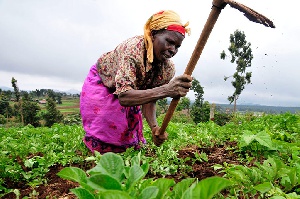About 200 farmers within the three northern regions have benefitted from the Traditional African Vegetables (TAV) crops varietal evaluation project dubbed “Enhancing productivity competitiveness and marketing of traditional African vegetables for improved income and nutrition in West and Central Africa.”
The three-year project, which is being implemented in Ghana, Burkina Faso and Cameroon, is to enhance productivity, competitiveness, and marketing of traditional African vegetables for improved income and nutrition in West Africa, while enabling farmers and traders to observe and select the various vegetable varieties that meet their preference based on dietary and markets considerations.
The farmer-led varietal evaluation is part of efforts by the World Vegetable Centre to enhance effective collaboration between farmers and researchers, to ensure that farmer knowledge, experience and needs are adequately incorporated into research output to enhance income and nutrition among people in rural areas.
The beneficiary farmers were drawn from selected communities within the three northern regions including Libga, Dufa, Sakplagu, Nyakpala, Bihinaayili, Zaazi and Nyouglu. The varieties of vegetables used for the demonstration were okra, eggplant, amaranth (alefu), jute mellow (ayoyo), roselle (bra) and African nightshades -- all being local products.
As part of the project’s aim of promoting production and consumption of traditional African vegetables, farmers will be supported to multiply seed varieties of their choice for cultivation; for both household consumption and income-generation during the dry season.
Some selected farmers will also be trained as commercial seed-growers for specific vegetables in order to maintain the seed stock. They will also be provided with technical support to enhance the quality of seeds for bumper harvests and also to ensure sustainability.
The Project Coordinator Yakubu Balma Issaka said the project will help to alleviate the numerous challenges that threaten food security in the country -- such as lack of quality seeds, limited knowledge of post-harvest storage and processing, poorly developed value chains, and creation of nutritional awareness.
Mr. Issaka said most countries fall within the top-20 worst-affected countries due to the proportion of under-nutrition, adding that the inadequate intake of protein affects the human system -- making people unable to contribute to the nation’s socio economic needs.
“Lack of dietary variety is a key factor, since most populations consume only cereals and cassava as their main food since they contain high carbohydrates -- which are low in nutrients.
“There is urgent need to identify and promote the most productive and nutritious cultivars of the proposed vegetables crops for income and local consumption while ensuring food and nutritional security,” he added.
He said the project will enrol about 5,000 households in each target country to improve the livelihoods of smallholder farmers and alleviate poverty by end of the project.
He said the households will be selected from farming communities, with primary focus on women and the youth since 80 percent of subsistence farmers engaged in vegetable production in the three regions are women, while 94 percent of the vegetable vendors are women.
“This will help to strengthen the role of women through training in vegetable production and marketing skills because the investment will not yield desired output without competent skills from the targeted beneficiaries,” he said.
Adam Salamatu expressed satisfaction with the project, saying it will help those beneficiaries to produce high yields and earn some income.
She noted that most of farmers are used to single crops, which do not attract buyers; and that introduction of the new varieties will help them to get good market and also expand their farms to feed the nation and export the rest for income-generation.
The project is being led by AVRDC-The World Vegetable Centre with financial support from the West and Central African Council for Agricultural Research and Development (CORAF/WECARD); with the local partners being University for Development Studies and the Savannah Agricultural Research Institute (SARI).
Business News of Sunday, 19 October 2014
Source: BFT
200 farmers introduced to new seed varieties
Entertainment












